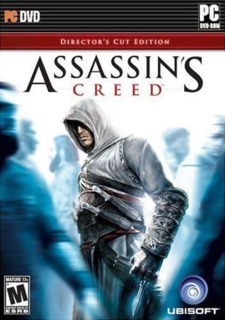Interesting, innovative, and stimulating. Right up until the final missions.
There are varying ways to classify an activity as "repetitive." If I take my sister out to dinner every Friday night, when does it qualify as repetitive? Always? Only if we go to the same place every time? Only if we order the same thing every time? Only if I get a Three-Cheese Nachos with chicken, extra black beans, hot salsa, cheese, no sour cream, and a topping of Cholula hot sauce every time? Be right back, now I need Qdoba.
Back. That's the issue with Assassin's Creed. Fundamentally, there are some repetitive tasks, but I found the execution of those tasks to be the draw. Sure, I was, again, tasked with the murder of several guys in order to get some information from an informer, but instead of being in dark alleyways these guys were in the middle of a busy market. The challenge comes not from the core task, but figuring out, on the fly, how to complete that task. Sure, it'd be incredibly boring if every instance of the task happened in a crowded market with the same configuration. But that's not what happens.
Unfortunately, Assassin's Creed really is like dating your sister. The core game is engaging, the story is a bit arcane but good enough to keep you rolling through cutscenes, and the visuals and controls are superb. There's a sense of style and danger to the whole package that really gets you hooked and keeps you hooked.
Then I went and finished the game. To paraphrase Douglas Adams, this made me angry, and has been widely regarded as a bad idea. Like dating your sister, the end of the relationship is where all the bad stuff comes out. In your sister's case, it's probably disownment (because, let's face it, your parents like your sister better) and public shame. In Assassin's Creed, it's what I refer to as the Ending Problem.
A fiction author spends a lot of time creating characters and worlds. If the author has any sort of talent, than these characters and worlds end up being multi-dimensional, with depth and the ability to react to any situation in a manner that's either:
1. Logically derived from past events in the world created by the story.
2. Completely out of character, which will only be accepted by the audience as "valid" if it then leads to a major change in the character for future interactions. (Granted, this assumes a competent audience, which, given recent box-office successes, may not be a safe assumption.)
What does the author hope to attain at the end of a tale? A "big finish," similar to ESPN'S PTI, but with less concern for NBA basketball. Yes, there's always the possibility of a sequel, but you still want to give your audience a "payoff" for their hours of attention.
There's the issue. If you logically derive a result, the changes of a proper big finish diminish rapidly. And if you, as an author, force scenario number 2, you have to damage the characters you've come to love so much.
This is exactly what happened in Assassin's Creed. The "authors" wanted a big finish. But they couldn't figure out how to make silently and stealthily sliding a blade into someone's throat climactic, so they went with the old standby: Horde of guys to fight, straight up. No joking. The entire last 3 hours of the game is nothing but you, a character who spent the entire game relearning the "creed of the assassins" by silently murdering people instead of the full frontal assualt that got you in trouble in the opening scene… performing a full frontal assault on King Richard's army. Seriously. That's worse than the ending of a Harry Potter book. Also, there are spoilers in this review.
So, how does the game rate? Without the ending war, ignoring the fact that it'd be a story without an ending, it'd be a solid 9, if you're the type of person who desperately craves numeric game reviews. With the ending war, it's probably a solid 7, saved and injured in equal parts due to the mind-bending ending to the story which both forces you to think a bit instead of drooling over a cutscene… and which practically screams "BUY THE SEQUEL."

